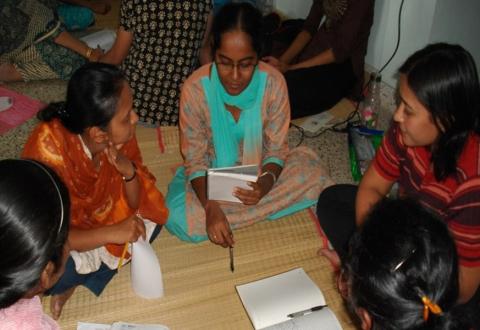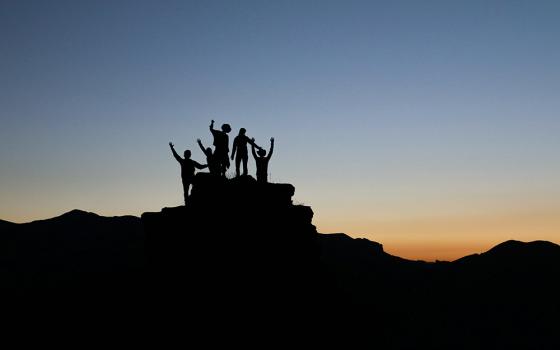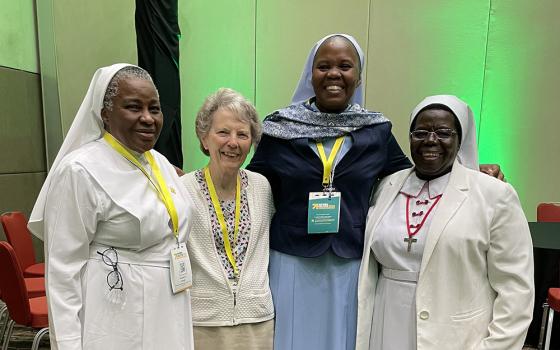
(Unsplash/Christin Hume)
While in the novitiate, we were given the books of female saints, virgins and martyrs like Perpetua, Felicity, Lucy, Agnes and Cecilia as witnesses to martyrdom, modesty, purity and perfect chastity.
As superiors and community leaders, we were given books like The Fire in These Ashes: A Spirituality of Contemporary Religious Life, and Scarred by Struggle, Transformed by Hope by Sr. Joan Chittister.
They say all stories are not true, but they lead us to the truth in a less threatening manner. Reading wise, witty and insightful books by Chittister, the most influential woman religious of the contemporary era, created a unique taste in my mind and I became addicted to reading, and was inspired to organize women writers' workshops.

Katherine Keefer's workshop for the women writers' workshop "Tell Your Tale & Write Your Heart Out" (Margaret Gonsalves)
I am not a writer but a storyteller. In 2008, I met Katherine Keefer, from California, at Osage Forest of Peace in Oklahoma. She was visiting India in May 2009, and I requested her to lead the first Women Writers' Workshop: "Tell Your Tale & Write Your Heart Out."
The participants at this workshop, though few, were all seasoned writers except myself.
The opening of the first workshop was very creatively welcoming with a tri-aarti with jasmine flowers, incense and light followed by an invocation to the Durga, the goddess of wisdom; Saraswati, the goddess of knowledge; and Mother Mary of Magnificat.
They completed the first part of the art and began narrating their stories, "that rise from deep suffering can provide the most potent remedies for past, present, and even future ills," as Clarissa Pinkola Estés says.
Each one's experiences were cathartic, nurturing their connection to one another and the place where they came from and where they were going.
Similar workshops were offered to the various groups. During the "Minor Rescued Girls" workshop, the participants were asked to choose an animal they like and write a poem with this opening line, "My soul …". Here is one example:
My soul jumps and plays
My soul dreams of playing with friends
My soul loves eating bananasMy soul walks firm-footed
It walks with power
Following her own directives,My soul has long teeth and gets angry
People are afraid of my soul.
Because I have big nails,My soul is energetic and runs fastest.
Sometimes, the soul is killed
And skin sold to make shoes, bags, belts,Sometimes, my soul is heavy,
And walks very slowly
Drink water and relax in a peaceful placeI like my soul
My soul has a powerful voice,
My soul is courageous.My soul prefers to be quiet,
My soul is fearful
My soul is threatened by the slightest sounds.
This particular young girl had chosen a lioness as her favorite animal. I noticed a lot of contradictions between the lion's personality, likes and dislikes. Reading "My soul loves eating bananas" was a shocking revelation because lions are carnivores. Monkeys like to eat bananas. Such a powerful soul of a lioness is tamed into a monkey? Also, "My soul is courageous" and "has a powerful voice," and "My soul prefers to be quiet" and "My soul is fearful," these words grieved my heart. Is this a sin of patriarchy and of trafficking, which mutes women's voices and quietens them with fear?
When I sent the invitations to women religious for the writers' workshop, the responses were endlessly repetitive, delivering their usual stream of negative, discouraging and even belittling narratives:
"I am not a writer, and my superiors will not allow me."
"It probably won't be any good anyway."
"Nobody will read my story."
"What's the point when I don't even know how to write a paragraph for my congregational newsletter?"
The responses of the sisters reveal that self-criticism has blocked their ability to access their inner wisdom.
Advertisement
Listening to their narratives with microscopic details, loaded with emotions in every piece of art, prose and poem, confronted my deepest truths and lies. It was a soul-searching experience for me. My heart questioned, have we lost the richness of women writers' voices?
I realized the power of creative imagination and art is at the core of every woman's soul. Their microscopic truthfulness explored, articulated and celebrated humanity. But when the soul of a woman is raped, what comes out is the cosmic tragedy.
Women storytellers are the "bridge-builders" and "connectors" of who the person is and what they want to become by following one's own dream.
The young rescued girls experienced a powerful nonviolent movement of the divine wisdom Sophia in their inner beings. They felt the freedom within to take a leap of faith toward their long-cherished dreams, which were buried as their bodies were sold and raped and their souls bruised permanently.
Sharing each other's writing through sculpting spoke a powerful language of healing and overcoming trauma to know that I am not the only person suffering. There are women with similar wounds and scars. These writers were sculpting the life of a reader.
Writing worked as a thesaurus, verbalizing and articulating the buried feelings, dreams and desires.
Through my efforts to write, I became aware that my God is much bigger than the dogmas, and every being becomes my kin and the cosmos becomes my church — radiant, active and alive.
By writing, I began hearing God speaking in many tongues, radiating in many colors and harkening us all in many voices, "that brings to the public debate the best in tradition, the finest in theological analysis, the keenest in social perception and the most challenging of Gospel values" (from The Fire in These Ashes).
As participants narrated their stories, we heard their voices, and within their voices, there were seeds of redemption and the advent of a whole new life.
Writing is a vocation and a prophetic ministry leading to reflecting on the inner workings of the Holy Spirit. While I read books and made efforts to write, I began capturing and distilling the sacredness of life without any institutional boundaries.
Writing is a journey of soul-seeing, a gateway to emotional and spiritual freedom, inner healing and conscious appreciation of life and a truly liberating vehicle.
I have come to realize that when a woman writes, she is a powerful catalyst for awakening and personal growth of the readers, clearing their emotions and opening their higher wisdom and deepest truths.
It's time for writing to take a respected place of honor among more venerated spiritual practices like meditation and prayer. Women's writing is perhaps a more powerful tool for processing their stories and emotions, opening to their higher truth and realizing their hopes and dreams.
"We [women] have a fraught relationship with our own dreams and aspirations," says Tania Tetlow, president of Fordham University. Author Mark Matousek's words speak to women: "You are the storyteller, not the tale. You are the witness, not the victim. You are the conscious, creative spirit, not the sum of your concepts and labels."
So, write, it touches the divinity within.








